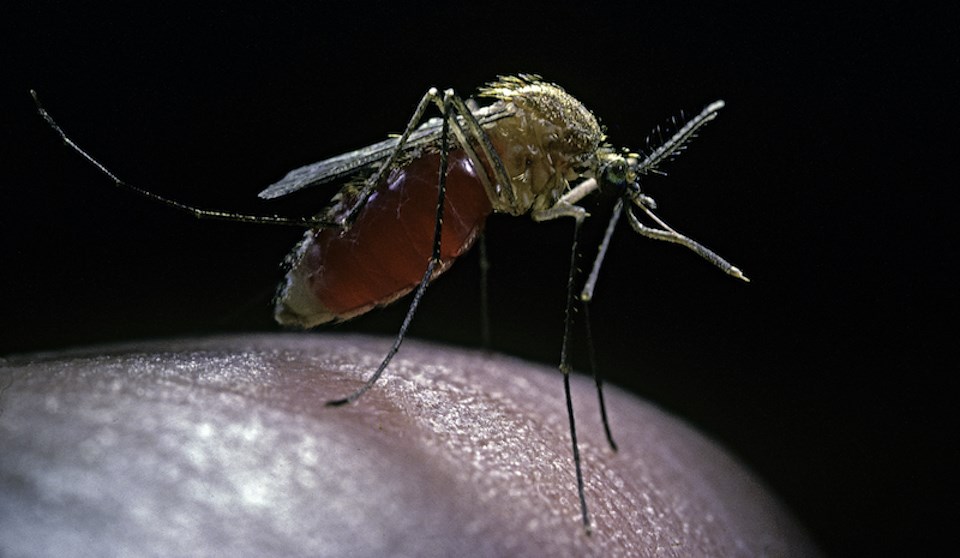If you aren't a fan of mosquitoes, you are not alone.
But if you love toasty temperatures in the Lower Mainland, then you'll have to learn to coexist with the problematic pests.
Unfortunately, sunny, hot weather provides ideal conditions for these tiny insects to multiply and thrive. And, if Environment Canada's current summer forecast holds true, we might be in for a rather intense, albeit short-lived mosquito season, according to a local expert.
Dr. Carl Lowenberger is a professor of entomology and parasitology at Simon Fraser University who researches diseases spread by insects, such as mosquitoes. One of his concerns for this year's season is the delayed snowmelt, which could produce a surge in numbers.
Some mosquitoes lay their eggs above the waterline and wait until snow melts or rivers rise for their eggs to hatch. In a year with a high snowpack, such as this one, there is a higher risk of flooding. If that flooding occurs, the waters will rise up where the mosquitoes have laid their eggs, explains the professor.
"Some of those eggs will last four, five, six, seven, [or] eight years...we've had that before," he tells Vancouver Is Awesome. "After seven or eight years maybe only 30 per cent will hatch...but still, you've got a lot of mosquito eggs waiting there for a water source to flood them."
But most mosquitoes don't depend on significant flooding events to reproduce.
Instead, the tiny creatures find potential breeding sites in ponds, rain barrels, flower planters, ornamental ponds, and low-lying spots that flood.
Mosquito season in Metro Vancouver
In actuality, there is no mosquito season in Metro Vancouver because some of them live year-round in the region. Lowenberger says they hibernate through the winter in places like attics and trees, emerging in the spring to feast. That said, these ones aren't considered the "nuisance" insects that emerge in surging numbers.
A cooler, wetter spring has afforded many places for the pests to lay their eggs. But Metro Vancouver didn't see the typical first generation of mosquitoes this year.
Below-average temperatures have slowed the start of "mosquito season" in the Lower Mainland. But the national weather forecaster calls for the hot weather to commence in the first week of July, which would prompt a mass emergence event, possibly followed by several others, explains the professor.
"We've got big larvae...we've got adults starting to emerge. But that's temperature-dependent," he said, noting that the creatures have already hatched. "So what's holding things back this year, [is] we've had a lot of water but we haven't had the heat.
"If we get a heat wave going through, I expect to see a lot more adults emerging over a few days."
Since there are so many water sources available, significant heat in early July could mean locals start to see an influx of mosquitoes by mid-month — and it won't stop there. Mosquitoes lay multiple generations of eggs over the summer season.
"We may have a shorter but very intense mosquito season if we get some real heat in July," he said. "That would be my prediction."
If there is a significant flooding event this year, that would further increase mosquito numbers, Lowenberger added.
Mosquito bites and beyond
While West Nile Virus is the most commonly spread vector-borne disease spread in North America, the BC Centre For Disease Control (BCCDC) only confirmed two cases in humans in 2021 and none in 2020.
But diseases carried by the pests aren't generally what makes them so despised among Metro Vancouverites. Mosquito bites are extremely itchy, and, depending on where you are, you might get bitten numerous times.
Anyone who has ever tried to sleep with one of the creatures buzzing near their ear can attest to their profoundly perturbing pitch, too.
There are several things you can do to prevent the troublesome critters from wreaking havoc in your home, however.
You can help control mosquito populations by preventing them from breeding or preventing the larvae from developing into adults. You do this by:
- removing standing water which provides breeding sites
- controlling the larvae with an approved product
You can also take the following steps to protect yourself:
- Use a fly swatter to kill mosquitoes in the home.
- Use an approved mosquito repellent with a PCP registration number on the label.
- Read and follow all label directions.
- Wear loose clothes made of tightly woven materials that keep mosquitoes away from your skin, such as nylon or polyester.
- Use mosquito netting when sleeping outdoors or in an unscreened structure. Also use netting to protect infants when outdoors.
- Wear long pants and sleeves as well as shoes and socks. You should do this if you're going to be outside when mosquitoes are most active.
- Fix or replace old and torn screens in doors, windows and vents. Inspect all other possible access points into your home and fix as needed.
Find out more information on the Government of Canada's mosquito page.


